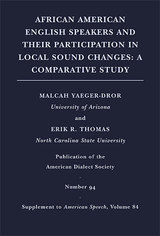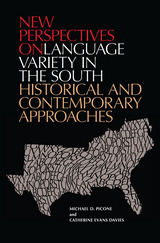4 books about Thomas, Erik R.

An Acoustic Analysis of Vowel Variation in New World English, Volume 76
Erik R. Thomas, ed.
Duke University Press
An Acoustic Analysis of Vowel Variation in New World English examines acoustical variations in vowel configurations in a wide variety of dialects of English found in the Western Hemisphere.
While the work opens with an introduction on the methods and aims of the study, the following chapter immediately moves to a detailed discussion of distinctive vowel sounds called phonemes, characterizing each variant of sound listed within the cited reference literature. The remaining chapters provide explanatory descriptions of the variants of each dialect, reviewing past research specific to that dialect. While the United States English, Canadian English, and Caribbean varieties are featured in various chapters throughout the work, individual chapters are devoted to African-American, Mexican-American, and Native American English, emphasizing not only ethnic variation but delving into the historical development of each dialect.
This monograph is an essential reference on vowel variation for all sociolinguists, phoneticians, phonologists, creolists, and historical linguists.
While the work opens with an introduction on the methods and aims of the study, the following chapter immediately moves to a detailed discussion of distinctive vowel sounds called phonemes, characterizing each variant of sound listed within the cited reference literature. The remaining chapters provide explanatory descriptions of the variants of each dialect, reviewing past research specific to that dialect. While the United States English, Canadian English, and Caribbean varieties are featured in various chapters throughout the work, individual chapters are devoted to African-American, Mexican-American, and Native American English, emphasizing not only ethnic variation but delving into the historical development of each dialect.
This monograph is an essential reference on vowel variation for all sociolinguists, phoneticians, phonologists, creolists, and historical linguists.
[more]

African American English Speakers and Their Participation in Local Sound Changes
A Comparative Study, Volume 84
Erik R. Thomas
Duke University Press
This volume examines variation in vowel configurations in African American English as spoken by members of seven U.S. communities, including Roanoke Island, North Carolina; Pittsburgh, Pennsylvania; and several parishes in rural Louisiana. The contributors argue that African American English exhibits considerable diversity, disproving the commonly held view that it is a uniform national dialect. Although some features of African American English are universal, others vary by region. In each community, African Americans adopted variants from local vernaculars. The study finds the most assimilation in the oldest communities in the rural South, where multiple races have lived together for centuries.
[more]

African American English Speakers and Their Participation in Local Sound Changes
A Comparative Study, Volume 84
Erik R. Thomas
Duke University Press
This volume examines variation in vowel configurations in African American English as spoken by members of seven U.S. communities, including Roanoke Island, North Carolina; Pittsburgh, Pennsylvania; and several parishes in rural Louisiana. The contributors argue that African American English exhibits considerable diversity, disproving the commonly held view that it is a uniform national dialect. Although some features of African American English are universal, others vary by region. In each community, African Americans adopted variants from local vernaculars. The study finds the most assimilation in the oldest communities in the rural South, where multiple races have lived together for centuries.
[more]

New Perspectives on Language Variety in the South
Historical and Contemporary Approaches
Michael D. Picone
University of Alabama Press, 2015
The third installment in the landmark LAVIS (Language Variety in the South) series, New Perspectives on Language Variety in the South: Historical and Contemporary Approaches brings together essays devoted to the careful examination and elucidation of the rich linguistic diversity of the American South, updating and broadening the work of the earlier volumes by more fully capturing the multifaceted configuration of languages and dialects in the South.
Beginning with an introduction to American Indian languages of the Southeast, five fascinating essays discuss indigenous languages, including Caddo, Ofo, and Timucua, and evidence for the connection between the Pre-Columbian Southeast and the Caribbean.
Five essays explore the earlier Englishes of the South, covering topics such as the eighteenth century as the key period in the differentiation of Southern American English and the use of new quantitative methods to trace the transfer of linguistic features from England to America. They examine a range of linguistic resources, such as plantation overseers’ writings, modern blues lyrics, linguistic databases, and lexical and locutional compilations that reveal the region’s distinctive dialectal traditions.
New Perspectives on Language Variety in the South: Historical and Contemporary Approaches widens the scope of inquiry into the linguistic influences of the African diaspora as evidenced in primary sources and records. A comprehensive essay redefines the varieties of French in Louisiana, tracing the pathway from Colonial Louisiana to the emergence of Plantation Society French in a diglossic relationship with Louisiana Creole. A further essay maps the shift from French to English in family documents.
An assortment of essays on English in the contemporary South touch on an array of compelling topics from discourse strategies to dialectal emblems of identity to stereotypes in popular perception.
Essays about recent Latino immigrants to the South bring the collection into the twenty-first century, taking into account the dramatic increase in the population of Spanish speakers and illuminating the purported role of “Spanglish,” the bilingual lives of Spanish-speaking Latinos in Mississippi, and the existence of regional Spanish dialectal diversity.
Beginning with an introduction to American Indian languages of the Southeast, five fascinating essays discuss indigenous languages, including Caddo, Ofo, and Timucua, and evidence for the connection between the Pre-Columbian Southeast and the Caribbean.
Five essays explore the earlier Englishes of the South, covering topics such as the eighteenth century as the key period in the differentiation of Southern American English and the use of new quantitative methods to trace the transfer of linguistic features from England to America. They examine a range of linguistic resources, such as plantation overseers’ writings, modern blues lyrics, linguistic databases, and lexical and locutional compilations that reveal the region’s distinctive dialectal traditions.
New Perspectives on Language Variety in the South: Historical and Contemporary Approaches widens the scope of inquiry into the linguistic influences of the African diaspora as evidenced in primary sources and records. A comprehensive essay redefines the varieties of French in Louisiana, tracing the pathway from Colonial Louisiana to the emergence of Plantation Society French in a diglossic relationship with Louisiana Creole. A further essay maps the shift from French to English in family documents.
An assortment of essays on English in the contemporary South touch on an array of compelling topics from discourse strategies to dialectal emblems of identity to stereotypes in popular perception.
Essays about recent Latino immigrants to the South bring the collection into the twenty-first century, taking into account the dramatic increase in the population of Spanish speakers and illuminating the purported role of “Spanglish,” the bilingual lives of Spanish-speaking Latinos in Mississippi, and the existence of regional Spanish dialectal diversity.
[more]
READERS
Browse our collection.
PUBLISHERS
See BiblioVault's publisher services.
STUDENT SERVICES
Files for college accessibility offices.
UChicago Accessibility Resources
home | accessibility | search | about | contact us
BiblioVault ® 2001 - 2024
The University of Chicago Press









